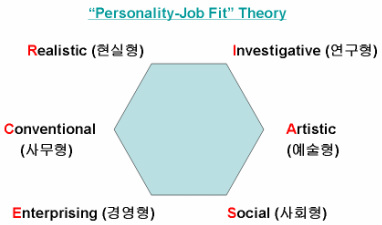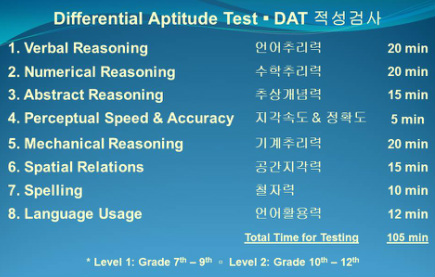진로-적성검사 (Career-Aptitude Assessment)
|
H2C의 진로적성-성격검사 워크숍
이 그룹 워크숍에서는 아래 3 가지 검사에서 나타나는 결과의 종합적 분석과 검사를 의뢰한 학생, 부모와의 개별적 상담으로 이루어집니다. Differential Aptitude Test (DAT), Career Assessment Inventory-Enhanced (CAI-E) 세가지 검사를 하게 되며, DAT 테스트를 통하여서 학생의 8 가지 학습영역상의 Normative Strength & Weakness에 근거하는 적성영역분석, EQ-i 검사를 통한 성격, 정서 및 행동특성평가, CAI 검사로 전공적성유형을 구체적으로 파악하게 되며, 학생이 소유한 자질이 어느 전공분야나 특정직업이 요구하는 학업 및 직무수행능력과 적응능력을 겸비하고 있는지를 분석한 다음 불확실성을 제거하여서 자신의 잠재능력을 극대화할 수 있는 진로 및 전공의 방향을 결정하도록 드립니다. |
진로적성-성격검사 워크숍
하 버 드 카 운 슬 링 센 터 3727 W. 6th Street Suite 507 Los Angeles, CA 90020 * 워크숍 참석 예약 및 문의는 전화 (213) 234-8268 또는 Contact Us 페이지에서 이메일로 문의하십시오. |
|
적성검사에서 무엇을 얻을 수 있나?
John Holland's "Personality-Job Fit" Theory
"Personality-Job Fit" 이론에 의하면 현대사회의 모든 직업유형은 현실형 (Realistic), 연구형(Investigative), 예술형 (Artistic), 사회형 (Social), 기업형 (Enterprising), 그리고 사무형 (Conventional) 이렇게 여섯 가지로 분류가 가능하며 우리 인간의 흥미유형도 비록 정도의 차이가 있겠으나 이 여섯 가지 유형의 어느 한 가지로 분류되어진다.
그림에서 6각형의 각 모서리에 여섯가지 직업유형이 나와 있는데 모서리 끼리 인접해 있을 수록 그 유형은 서로 닮았으며, 서로 멀어질수록 직업의 형태도 달라진다. 그래서 현실형은 인접한 사무형이나 연구형과는 가깝지만 사회형이나 경영형 그리고 예술형하고는 거리가 있다고 하겠다. 서로 마주 보고 있는 직업유형 끼리는 대조적이라고 할 수 있다. 그래서 연구형과 경영형은 하는 일이나 직업이 요구하는 자질에서 큰 차이를 보이게 된다. 이 흥미유형에서의 차이는 실제 전공이나 직업에서는 실상 엄청난 큰 차이로 나타나고는 한다. 예를 들자면 여기 경영형(Enterprising)에서 인간관계를 관리, 통제하는 것하고 사회형(Social)에서 발생하는 인간관계의 문제를 다루는 것 하고는 서로 매우 다른 양상을 나타내 보인다. 사실은 극과 극의 서로 다른 기능을 요구하고 있다. 경영형에서의 인간관계는 때로는 다른 사람들의 입장을 전혀 고려치 않는 냉엄한 관리, 통제를 요구한다면, 사회형에서는 정반대로 전적으로 다른 사람들의 문제나 사정을 고려하여서 인간관계를 유지하는 그런 차이라고 하겠다. John Holland 박사에 의하면 사람은 자신이 잘 하지 못하는 분야에 들어가서 일을 하고 있으면 항상 다른 분야, 즉 좀 더 자신이 편하게 잘 일 할 수 있는 분야를 찾기위해서 늘 다른 직업, 다른 전공을 찾기 위해 노력을 한다고 한다. 그래서 자신의 흥미유형이 아닌 그런 전공, 직업에서 대체로 최선을 다하지 않으며 항상 다른 기회를 찾아서 떠날 준비를 하는 것으로 밝혀져 있다. 결국 자신의 흥미유형과 일치하지않는 직업군이나 전공에서 최고의 전문가("전문가들의 무한경쟁시대" 참조바람)가 되기는 어렵다고 하겠다. |
Level 1: Grade 7th - 9th
Level 2: Grade 10th - 12th Scoring 15 - 20 minutes Discussion 30 minutes Grand Total Approximately 150 minutes (2 hour 30 minutes) 아동-청소년 (7:0세 - 18:0세 까지)
대학생-성인 (18:0세 이상) 검사소요시간: 약 30분 EQ-i 5대 행동기능특성 (EQ-i Model of Emotional Intelligence):
1. Self-Perception (자아개념):
2. Self-Expression (자기주도기능)
3. Stress-Management (스트레스 관리기능)
4. Interpersonal Functioning (대인관계기능)
5. Decision-Making (문제해결-판단기능)
EQ-i Emotional Intelligence Inventory 샘플 리포트 (Leaving HCC Website) CAI 흥미유형검사 (Based on "Personality-Job Fit" Theory)
전공분야에 관한 흥미 또는 관심은 성장과정에서 부모와 주변 환경의 영향을 강하게 받아서 형성이 되는것으로 알려져 있다. 그러나 때로는 어떤 강한 외부적 자극이 주어졌을 때도 이는 변화할 수 있는 것으로 알려져 있다. 가령 의료분야에 무관심하던 학생이 가족 중에 누군가가 퇴행성질환을 앓게 되면서 이러한 질병분야에 갑작스러운 흥미가 생겨날 수 있으며, 발달장애아를 동생으로 둔 누나가 임상심리학분야를 선택하거나, 또 사회봉사활동에 참가하였다 질병과 가난에 시달리는 사람들을 보고 온 다음 보건복지, 사회운동에 강한 흥미가 생겨나는 경우가 그러하다.
흥미유형은 흔히 본인이 가장 원하는 분야, 즉 동기부여가 가장 강하게 되어있는 분야를 나타내기에 흥미유형이 전공으로 곹 연결이 되는 경우도 흔히 있다. 그러나 이때 학생이 자신의 흥미유형으로 성공하기 위해서는 그 분야가 요구하는 고유한 인지기능 적성, 성취도, 그리고 성격 및 행동특성이 뒷바침 되어 줄 때 흥미유형은 비로소 그 개인의 전공 및 진로와 부합한다고 하겠다. 대표적인 흥미유형검사로는 John Holland의 "Personality-Job Fit" 이론(그림 1 참조)을 근거로 하여서 만들어진 Self-Directed Search (SDS), Strong Interest Inventory, Career Assessment Inventory-Enhanced Version 등이 있으며 HCC 적성검사에서는 Career Assessment Inventory-Enhanced Version을 사용하고 있다. |
What They Don’t Teach You at Harvard Business School
Mark McCormack
In the book What They Don't Teach You in the Harvard Business School, Mark McCormack tells a study conducted on students in the 1979 Harvard MBA program. In that year, the students were asked, "Have you set clear, written goals for your future and made plans to accomplish them?" Only three (3) percentof the graduates had written goals and plans; 13 percent had goals, but they were not in writing; and a whopping 84 percent had no specific goals at all.
Ten years later, the members of the class were interviewed again, and the findings, while somewhat predictable, were nonetheless astonishing. The 13 percent of the class who had goals were earning, on average, twice as much as the 84 percent who had no goals at all. And what about the three percent who had clear, written goals? They were earning, on average, ten times as much as the other 97 percent put together.
In spite of such proof of success, most people don't have clear, measurable, time-bounded goals that they work toward. In the bestseller "Goals!", Brian Tracy teaches you how to identify in the clearest terms the things you want out of life, then how to make the plan to help you achieve those things. Brian Tracy says there are four reasons why people don't set goals:
Mark McCormack
In the book What They Don't Teach You in the Harvard Business School, Mark McCormack tells a study conducted on students in the 1979 Harvard MBA program. In that year, the students were asked, "Have you set clear, written goals for your future and made plans to accomplish them?" Only three (3) percentof the graduates had written goals and plans; 13 percent had goals, but they were not in writing; and a whopping 84 percent had no specific goals at all.
Ten years later, the members of the class were interviewed again, and the findings, while somewhat predictable, were nonetheless astonishing. The 13 percent of the class who had goals were earning, on average, twice as much as the 84 percent who had no goals at all. And what about the three percent who had clear, written goals? They were earning, on average, ten times as much as the other 97 percent put together.
In spite of such proof of success, most people don't have clear, measurable, time-bounded goals that they work toward. In the bestseller "Goals!", Brian Tracy teaches you how to identify in the clearest terms the things you want out of life, then how to make the plan to help you achieve those things. Brian Tracy says there are four reasons why people don't set goals:
- They don't realize about the importance of goals. If the people with whom you spend the most time — family, friends, colleagues, and so forth — are not clear and committed to goals, there is a chance that you will not be, either.
- They don't know how to set goals. Some set goals that are too general. These are, in reality, fantasies common to everyone. Goals, on the other hand, are clear, written, specific, and measurable.
- They fear failure. Failure hurts, but it is often necessary to experience failure in order to achieve the greatest success. Do not unconsciously sabotage yourself by not setting any goals in which you might fail.
- They fear rejection. People are often afraid that if they are unsuccessful at achieving a goal, others will be critical of them. This is remedied by keeping your goals to yourself at the outset; let others see your results and achievements once you've accomplished your goals.
php.Element.Def.Pdf_Fallback



